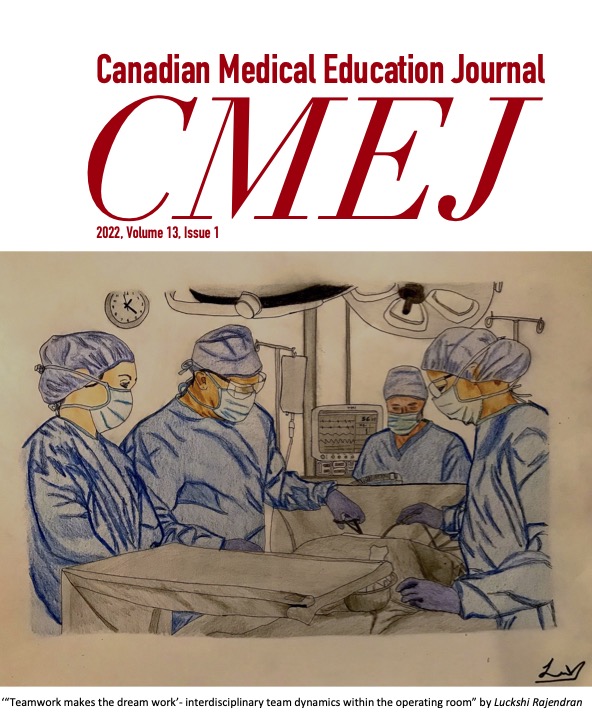Residents’ transformational changes through self-regulated, experiential learning for professionalism
DOI:
https://doi.org/10.36834/cmej.70234Abstract
Purpose: Postgraduate trainees (‘residents”) are required to convey professional behaviours as they navigate complex clinical environments. However, little is known about experiential learning for professionalism. Thus, we asked residents about professionalism challenges within the clinical learning environment: 1) how challenges were identified, 2) what supported successfully addressing challenges and 3) the impact of addressing challenges to further inform resident education.
Method: From 2015-2016, twenty-five residents across specialties and multiple university affiliated teaching hospitals participated in appreciative inquiry informed audio-taped semi-structured interviews. Transcripts were categorized deductively for the 2015 CanMEDS Professional Role element addressed (commitment to patients, society, the profession, and physician health). A pragmatic research paradigm focussed descriptive data analysis on actions and outcomes.
Results: Residents actively identify opportunities for experiential learning of professionalism within the clinical workplace– addressing conflicting priorities with interprofessional clinicians to ensure excellent patient care, providing informal feedback regarding peers’ and other healthcare clinicians’ professionalism lapses and by gaining self-awareness and maintaining wellness. There were no descriptions of commitment to society. Values, relationships, and reflection supported professional behaviours. Many described transformative personal and professional growth as an outcome of addressing professionalism challenges.
Conclusions: Residents self-regulated experiential learning for professionalism often results in transformational changes personally and professionally. Elucidation of how residents
successfully navigate power dynamics and conflict to provide excellent patient care and feedback for professional regulatory behaviour will support professionalism education. An interprofessional research lens will be valuable to explore how best to incorporate commitment to society within clinical environments.
Downloads
Published
Issue
Section
License
Copyright (c) 2019 Janet M de Groot, Aliya Kassam, Dana Swystun, Maureen Topps

This work is licensed under a Creative Commons Attribution-NonCommercial-NoDerivatives 4.0 International License.
Submission of an original manuscript to the Canadian Medical Education Journal will be taken to mean that it represents original work not previously published, that it is not being considered elsewhere for publication. If accepted for publication, it will be published online and it will not be published elsewhere in the same form, for commercial purposes, in any language, without the consent of the publisher.
Authors who publish in the Canadian Medical Education Journal agree to release their articles under the Creative Commons Attribution-Noncommercial-No Derivative Works 4.0 Canada Licence. This licence allows anyone to copy and distribute the article for non-commercial purposes provided that appropriate attribution is given. For details of the rights an author grants users of their work, please see the licence summary and the full licence.











